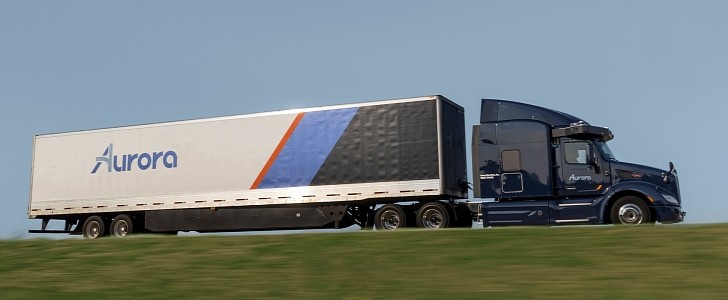When tech veterans Chris Urmson, Sterling Anderson, and Drew Bagnel got together and formed Aurora in 2017 to develop a robust autonomous vehicle platform, they adopted a two-industry approach: their plans focused on creating self-driving technology for robotaxis and trucks for hauling freight.
Last year, the company partnered with Toyota, which supplied the company with Toyota Sienna minivans for testing a robotaxi pilot program in several U.S. cities, with the intent of launching a service in the U.S. in 2024. The company would use data provided by partner Uber to decide on the best cities to launch.
However, before officially launching a robotaxi service, the company aims to introduce a revenue-generating robotic truck system by 2023.
Urmson, Aurora's CEO and co-founder, said during a Wednesday (August 3) conference call with industry analysts and investors, "We're going to be putting more emphasis on trucking and making sure that product makes it to market."
While the company continues to work with Toyota on their robotaxi ambitions, they have enlisted truck partners Peterbilt and Volvo to help in the development of their trucking products. They have also brought aboard FedEx, Uber Freight and motor carriers Werner and Schneider National, and established freight hauling pilot programs.
Aurora's fleet of testing vehicles currently on public roads consists of twenty autonomous Class 8 tractors and eight self-driving Toyota Sienna minivans. The vehicles have a human safety driver, but the long-term plan is to have vehicles operating without one.
A bi-product of the self-driving technology is the opportunity to offer freight hauling services that the company is keen to capitalize on. Currently, the company has freight operations on two Texas test routes: Dallas to Houston, and Fort Worth to El Paso. During the second quarter, the company averaged fourteen loads per week, with the expectation that will increase to forty per week by the end of the year, and one hundred late next year. The company also plans to expand the network of routes and increase load capacity.
What is not clear is whether the company will enter the fray of hauling freight as a separate company, or simply supply freight haulers with the technology to operate their respective fleets autonomously.
However, before officially launching a robotaxi service, the company aims to introduce a revenue-generating robotic truck system by 2023.
Urmson, Aurora's CEO and co-founder, said during a Wednesday (August 3) conference call with industry analysts and investors, "We're going to be putting more emphasis on trucking and making sure that product makes it to market."
While the company continues to work with Toyota on their robotaxi ambitions, they have enlisted truck partners Peterbilt and Volvo to help in the development of their trucking products. They have also brought aboard FedEx, Uber Freight and motor carriers Werner and Schneider National, and established freight hauling pilot programs.
Aurora's fleet of testing vehicles currently on public roads consists of twenty autonomous Class 8 tractors and eight self-driving Toyota Sienna minivans. The vehicles have a human safety driver, but the long-term plan is to have vehicles operating without one.
A bi-product of the self-driving technology is the opportunity to offer freight hauling services that the company is keen to capitalize on. Currently, the company has freight operations on two Texas test routes: Dallas to Houston, and Fort Worth to El Paso. During the second quarter, the company averaged fourteen loads per week, with the expectation that will increase to forty per week by the end of the year, and one hundred late next year. The company also plans to expand the network of routes and increase load capacity.
What is not clear is whether the company will enter the fray of hauling freight as a separate company, or simply supply freight haulers with the technology to operate their respective fleets autonomously.





